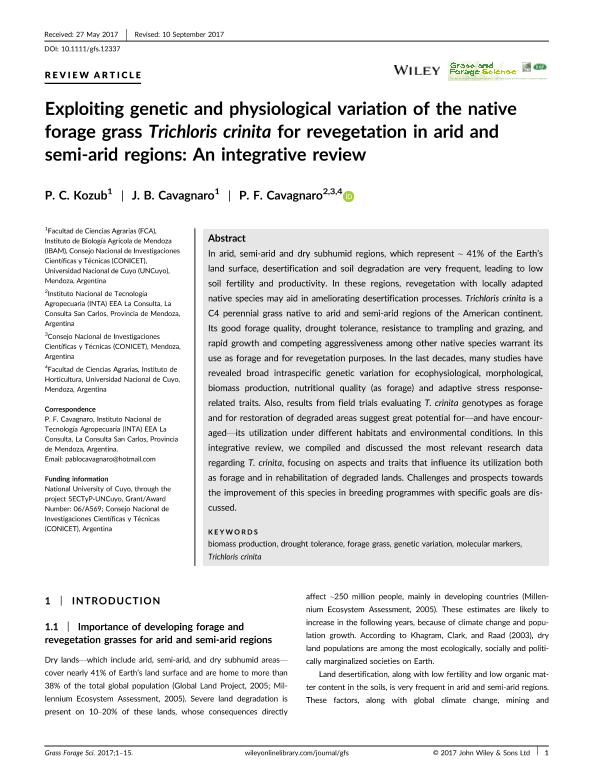Artículo
Exploiting genetic and physiological variation of the native forage grass Trichloris crinita for revegetation in arid and semi-arid regions: An integrative review
Fecha de publicación:
11/2017
Editorial:
Wiley Blackwell Publishing, Inc
Revista:
Grass and Forage Science
ISSN:
0142-5242
Idioma:
Inglés
Tipo de recurso:
Artículo publicado
Clasificación temática:
Resumen
In arid, semi-arid and dry subhumid regions, which represent ~ 41% of the Earth's land surface, desertification and soil degradation are very frequent, leading to low soil fertility and productivity. In these regions, revegetation with locally adapted native species may aid in ameliorating desertification processes. Trichloris crinita is a C4 perennial grass native to arid and semi-arid regions of the American continent. Its good forage quality, drought tolerance, resistance to trampling and grazing, and rapid growth and competing aggressiveness among other native species warrant its use as forage and for revegetation purposes. In the last decades, many studies have revealed broad intraspecific genetic variation for ecophysiological, morphological, biomass production, nutritional quality (as forage) and adaptive stress response-related traits. Also, results from field trials evaluating T. crinita genotypes as forage and for restoration of degraded areas suggest great potential for-and have encouraged-its utilization under different habitats and environmental conditions. In this integrative review, we compiled and discussed the most relevant research data regarding T. crinita, focusing on aspects and traits that influence its utilization both as forage and in rehabilitation of degraded lands. Challenges and prospects towards the improvement of this species in breeding programmes with specific goals are discussed.
Archivos asociados
Licencia
Identificadores
Colecciones
Articulos(CCT - MENDOZA)
Articulos de CTRO.CIENTIFICO TECNOL.CONICET - MENDOZA
Articulos de CTRO.CIENTIFICO TECNOL.CONICET - MENDOZA
Articulos(IBAM)
Articulos de INST.DE BIOLOGIA AGRICOLA DE MENDOZA
Articulos de INST.DE BIOLOGIA AGRICOLA DE MENDOZA
Citación
Kozub, Perla Carolina; Cavagnaro, Juan Bruno; Cavagnaro, Pablo Federico; Exploiting genetic and physiological variation of the native forage grass Trichloris crinita for revegetation in arid and semi-arid regions: An integrative review; Wiley Blackwell Publishing, Inc; Grass and Forage Science; 11-2017; 1-15
Compartir
Altmétricas




